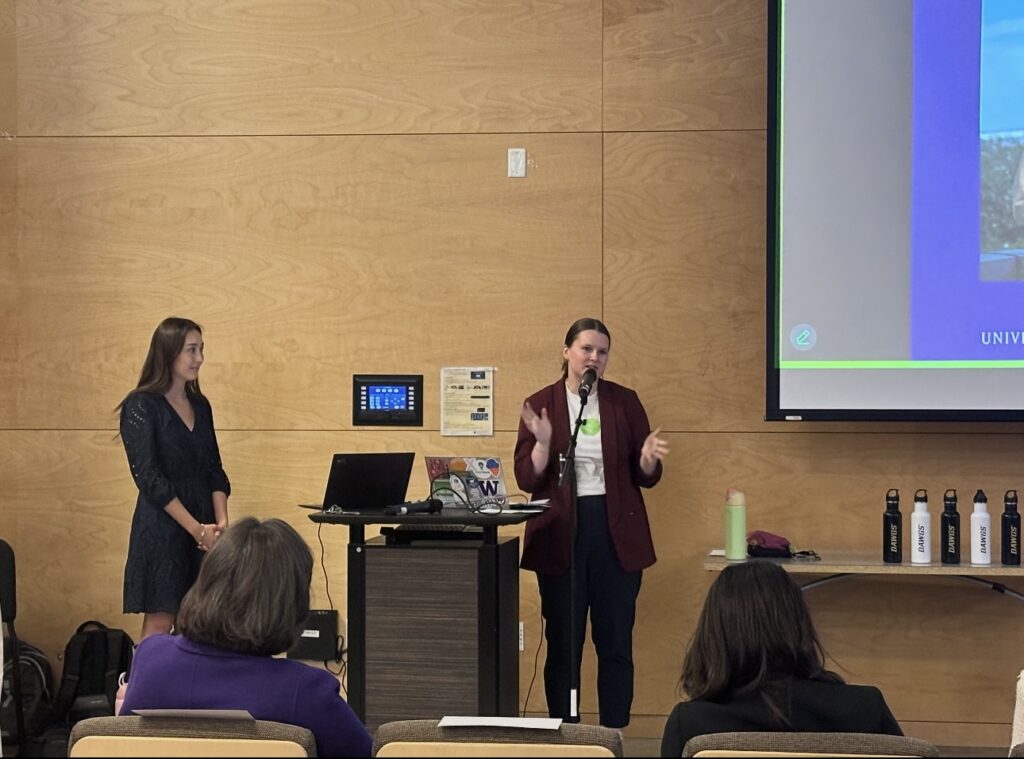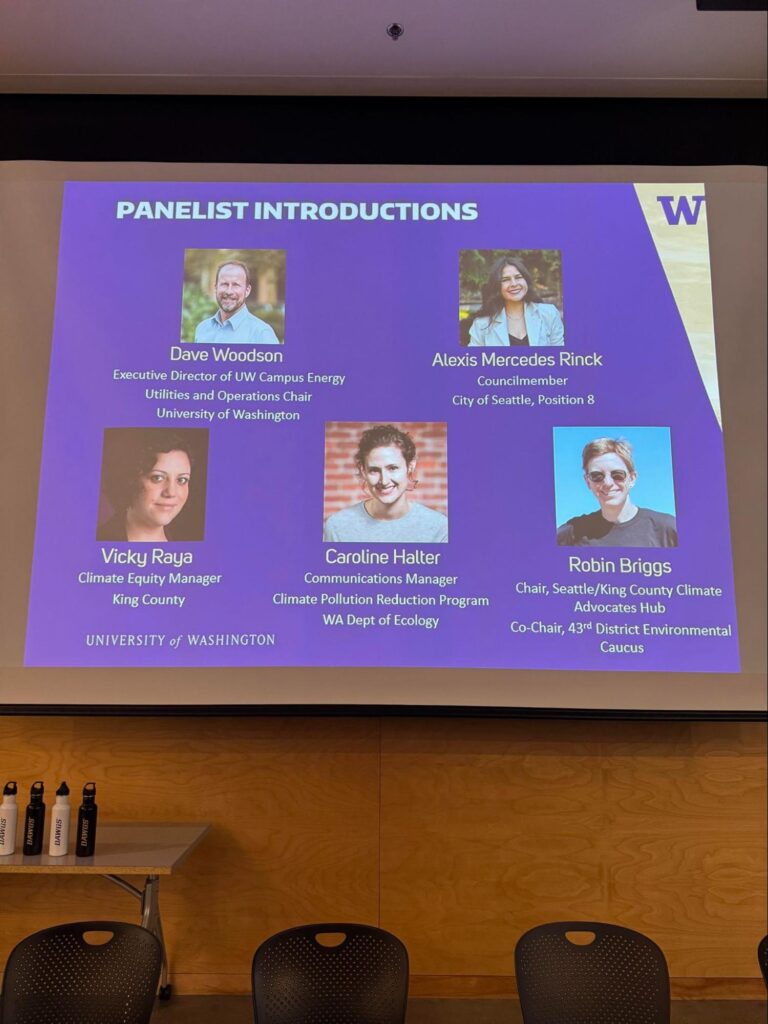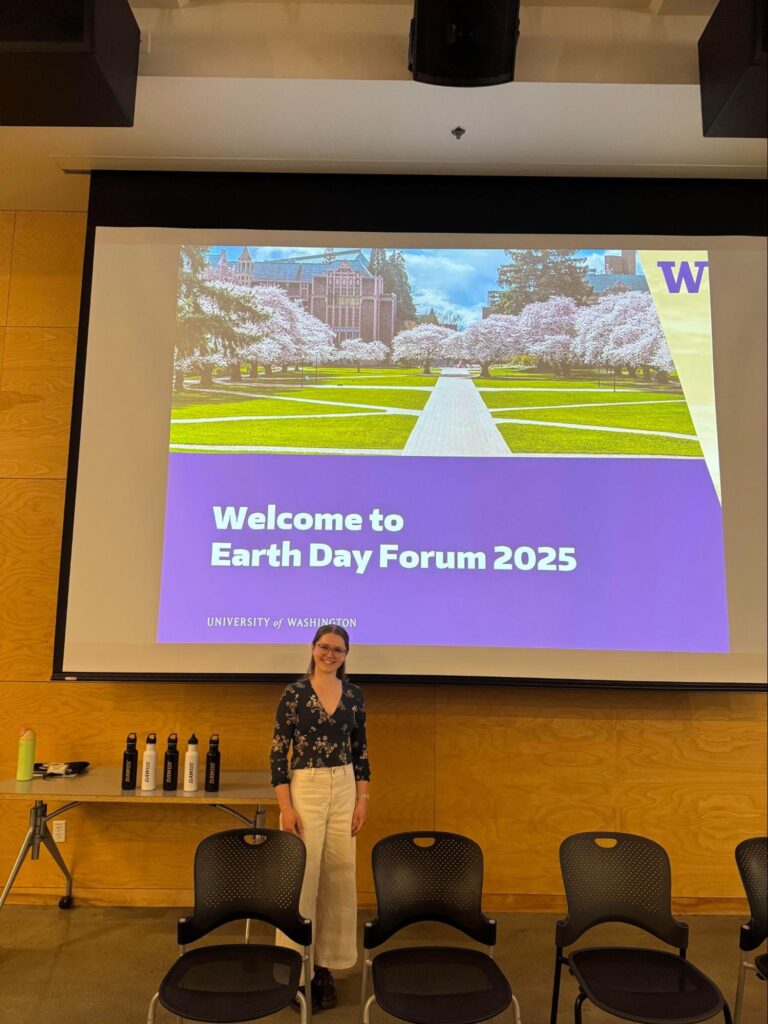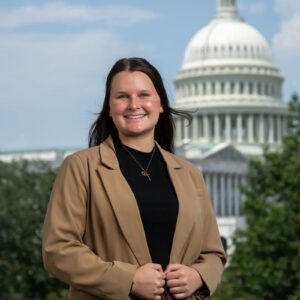Campus Coalition
Colleges Need The Campus Coalition
June 5, 2025
Returning to my hometown to speak at a panel at the University of Washington (UW) wasn’t just a personal milestone—it was a powerful reminder of how far EARTHDAY.ORG’s Campus Coalition has come.
Being involved from the early planning stages through to the event’s conclusion gave me a full-circle view of what can happen when students, institutions, and community leaders come together with purpose. Colleges are where we learn to think, and learn and make friends and find out who we are and there’s never been a more important time to support and encourage our campus community.
This particular panel was the result of a fantastic partnership between EARTHDAY.ORG’s Campus Coalition and UW Sustainability—especially Dahlia Gietka (pictured below) and her team—whose vision and coordination made the event both meaningful and seamless. It was held right on UW’s campus, on Earth Day itself, April 22.
One of the most powerful moments came from Seattle City Council Member Alexis Mercedes Rinck, Chair of the Sustainability Committee: “Hope is discipline, and pessimism is a luxury we cannot afford.”
Her presence underscored the connection between local policy and grassroots action—and she even announced that Seattle had officially updated its Climate Action Plan that day, adding bold new goals to accelerate sustainability across the city.
For me, it was especially meaningful to speak about EARTHDAY.ORG and our mission in front of UW Provost Tricia Serio, Council Member Rinck, and a standout panel of experts: Robin Briggs (Climate Advocates Hub Seattle), David Woodson (UW Executive Director of Campus Energy), and Vicky Raya (Climate Equity Manager for King County). Their insights grounded the discussion in urgency, equity, and possibility—exactly what this work demands.



The Growth of the Campus Coalition
This panel wasn’t just a success in the moment—it reflected how far the Campus Program has come. Over the past year, our coalition has evolved into a more strategic, impactful, and scalable movement, thanks in large part to two major developments: a robust internship program and the launch of the Global Fellows Program.
These efforts helped significantly increase both the quantity and quality of Earth Day events, expanding our presence across the U.S. and around the world, and giving students the space to lead.
Internship Program
One of the most exciting developments this year was the expansion of our internship program. We brought on 16 interns during the spring semester who played a critical role in keeping the momentum going across campuses.
Even better? 100% of interns said they would recommend this experience to a friend. That kind of feedback speaks volumes about the value, structure, and support of the program. These students didn’t just show up—they delivered meaningful results and helped power one of our most successful years to date.
The Creation of the Global Fellows Program
Last year, the Campus Coalition had no international footprint. This year, we launched the Global Fellows Program—and that changed everything.
International college students who hosted Earth Day events on their campuses were awarded EARTHDAY.ORG Global Fellow certificates, recognizing their leadership and linking them to our mission. This resulted in events in 14 countries, each addressing local environmental issues while aligning with our global message. It’s a grassroots, low-cost model of international engagement that is already proving scalable, authentic, and powerful.
Growth in Raw Numbers
Even without programmatic funding increases, our team delivered meaningful growth. This year wasn’t just bigger—it was smarter, more aligned, and more impactful.
Some highlights from 2025:
Events took place in 22 U.S. states and 14 countries—up from 16 states and 0 countries last year. We supported 6 rallies, 1 public proclamation event, 28 public forums, and 23 panels.
109 events explicitly embraced the “Our Planet, Our Power” (OPOP) theme—a 61% increase from 2024. 67 events had direct EDCC support or used the OPOP theme—a 77% jump from last year. 32 events specifically adopted the OPOP theme—a 113% increase over 2024.
But the numbers only tell part of the story.
One of the clearest signs of progress was the organic adoption of the OPOP theme. In 2024, most themed events came from direct EDCC guidance. In 2025, students took initiative—embedding the message into their events without prompting, instruction, or funding. That shift in ownership reflects real growth. These weren’t just Earth Day events. They were student-driven, mission-aligned actions—evidence of a deeper commitment to the campaign’s values.
We also exceeded our thematic goals. In 2024, just 33% of supported events matched our campaign theme. In 2025, 100% did.
Just to be Clear
Our tiny team of myself, Lee Franklin and our amazing interns spent countless hours in the office grinding through spreadsheets, emails, logistics, and outreach strategies. We held hundreds of meetings with colleges and partners to make this possible. This growth is the result of that work. From hosting events in 22 states and 14 countries to centering the OPOP theme in forums, rallies, and panels, campuses showed what’s possible with no direct funding—but plenty of leadership.
With a clear strategy and unstoppable grassroots energy, the Campus Team didn’t just grow in scale—they grew in purpose. And that’s what sets the stage for even greater impact ahead.
If you want to join the Campus Coalition please email Lee directly at [email protected], whether you’re a student, a student body or group or a college department, Lee is happy to work alongside you and together you can work out how to keep growing the movement! Join us!
